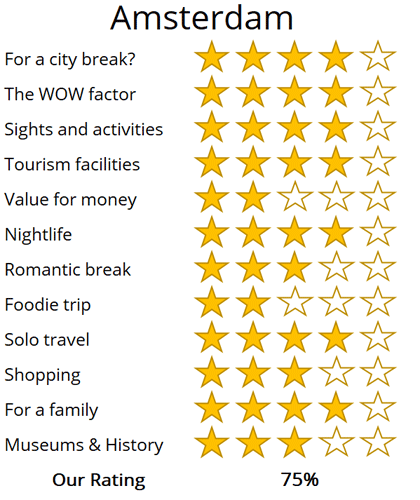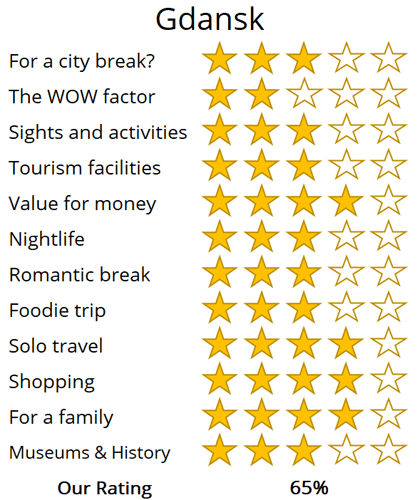WhereToGoForMyHoliday.com
The best destination comparison site!
WhereToGoForMyHoliday.com
The best destination comparison site!
Gdansk or Amsterdam, which is better for your holiday in 2024?
Amsterdam and Gdansk both offer unique and enticing experiences, but which one should you choose for your city break or holiday?
We recognise the difficulty in making this decision. While there is abundant information available on both destinations, clear guidance on which city better aligns with your travel preferences is often hard to find.
This article aims to provide an impartial comparison of Amsterdam and Gdansk, and hopefully help you to choose the best city to visit.
The article is structured into several sections, each of which can be directly accessed through the following links:
• Introduction to the cities
• Scores and ratings
• Which one should I, friends, or family visit?
• When to visit and weather
• Who is the city suited for?
• The perfect 48hours (with map)
• Tourism details (where to stay? airport details?)
Introduction to Amsterdam and Gdansk
Amsterdam, known as Europe's most liberal city, is an exceptional destination full of charm and unique character. While it continues to attract visitors drawn to its quirky and unconventional side, such as the famous coffee shops selling everything but coffee, and the infamous red-lit streets, the city is striving to transcend these stereotypes.
Today, Amsterdam is reinventing itself as a hub of culture and style, boasting world-class museums, a vibrant nightlife, and a welcoming attitude that distinguishes it from other cities. Far from a one-dimensional destination, Amsterdam offers an enriching experience that marries its lively past with an exciting and sophisticated future.

Central Gdansk
Salt-washed, industrial-chic and filled with hipsters, Gdansk is one of the most happening cities in Poland. It sits on the edge of the Baltic Sea, proudly showcasing its merchant guilds and mansions, a leftover from the years when this was one of the richest ports in the Hanseatic League.
Like most Polish cities, the focal point is an immersive Old Town (also called the Main City) that beats with life and cafés and boutique shops. Around that's a newer city where the remnants of Communist rule still pop up in the tenement blocks and the famous dockyards where the Solidarity movement heralded the beginning of the end for the USSR in the 1980s.
On top of all the architecture and culture is a vibey bar scene that's powered by a hefty student population. There are clubs and pubs everywhere, from the open-air boats on the quaysides to the hidden basement bars in the old quarter. What's more, Gdansk is the gateway to the Polish coast, with Hel Peninsular and its oat-topped dunes close by, or the resort town of Sopot only a short train ride away.
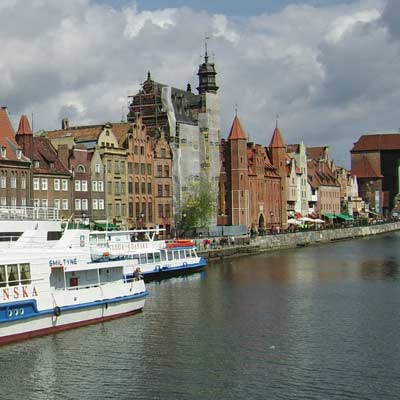
The scenic Długa waterfront in Gdansk
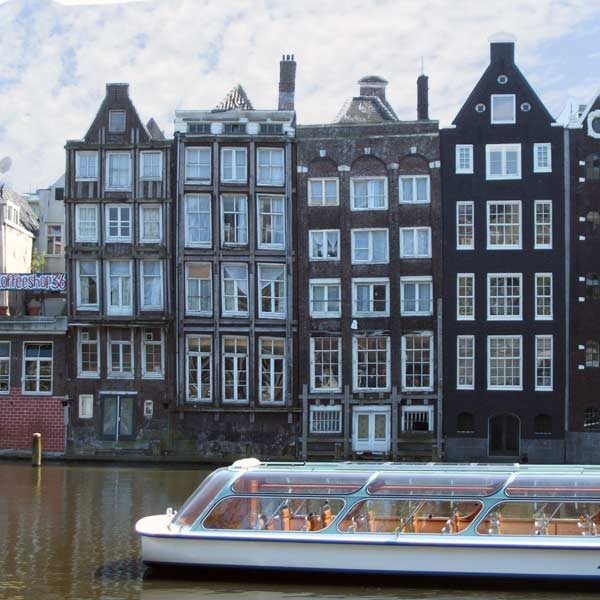
Singel canal in Amsterdam with typical Dutch houses and houseboats.
High-level summary Amsterdam and Gdansk
Summary
Where would I journey for a personal escape? Amsterdam
Where would I send my parents for a memorable visit?
Amsterdam
Where's the ideal destination for my adventurous 19-year-old cousin?
Amsterdam
Where should my food-obsessed friend indulge their culinary passions?
Amsterdam
Note: The above comparisons are weather-independent and are based on travel during the most opportune times of the year. Details about the ideal travel seasons are elaborated upon later in this article.
In the sections that follow, you'll find a comprehensive comparison between these two fascinating cities. This includes recommendations on the duration of stay, the best times to visit, and tailored 48-hour itineraries for each city.
The final segment delves into practicalities for your travels, such as the best airport to fly into, the optimal districts for your accommodation, and insider tips, for when you come to explore the city.
We hope that you find all of this information useful, in planning your next exciting trip!
Destination details
How long to spend each city?
Gdansk can be done in just a couple of days, but don't expect that to be enough to do everything. You'll likely want to linger longer, if only to beachcomb the Baltic coast, explore the other corners of the Tri-City (Gdansk is just one of three individual towns that are joined together), and sample as many of the cool hipster bars as you can.
Still, city breaks are very much doable here. Just 48 or 72 hours is ample for checking off the historic sights in the centre, the fascinating dockyards monuments, and to get a feel for the unique fusion of Slavic-Germanic architecture that abounds. Expect to do a lot of walking, though, and be ready to hop on inner-city trains and trams to get from A to B.
During the summertime, you could opt to do as thousands of Polish locals do and extend your Gdansk holiday to a week or two. That'll let you head out to the coast and the beaches. They can be surprisingly stunning, especially along the breezy Hel headland.
A three-day stay is perfect to truly capture the essence of Amsterdam, allowing for a brief day trip beyond the city limits. Any shorter visit might feel hurried, particularly for first-time visitors.
If time allows, the surrounding area boasts a wealth of worthwhile destinations. Keukenhof, the world's largest flower garden, is a popular destination in spring. Additionally, the Zaanse Schans Windmills and the enchanting 'Kasteel De Haar' castle are nearby
Additionally, many visitors opt to explore the planned cities of Almere or Lelystad, constructed on reclaimed land and just a 20-minute train journey from the central station These modern cities take pride in showcasing cutting-edge architectural design.
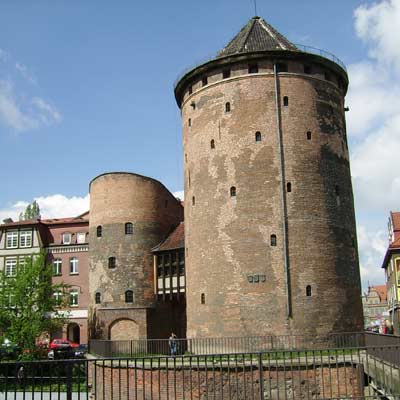
The Stągwie Mleczne was the ancient gateway to the southern side of Gdansk
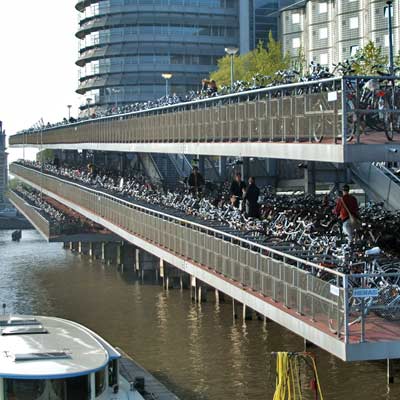
The Dutch love to cycle…..
Spring is the ideal time to visit Amsterdam, just before the rush of the summertime tourist season. During this period, you have the opportunity to partake in the festive King's Day celebration in April or marvel at the endless sea of tulips at Keukenhof.
August is Amsterdam's warmest month, with average temperatures hovering around 22 degrees Celsius (71°F) — a mild warmth by many standards! Winter can bring temperatures down to just above freezing, making for a chilly experience. The weather in Amsterdam is notoriously unpredictable throughout the year, so it's wise to come prepared for all conditions. Whether it's wind or rain, don't be surprised if at least one day of your visit is met with inclement weather.
Gdansk is surely at its best in the warmer months. Between May and September is when most travellers come. They get to enjoy all the al fresco bars along the old port. They can wander the Old Town without worrying (too much, at least) about rain. They can hit the open-air terraces to taste pierogi dumplings. The weather is a little milder than inland Poland thanks to the tempering effect of the Baltic Sea. Average highs in July are in the low 20s, but that's enough to bring crowds to the beaches of Sopot and the north coast.
The winter in Gdansk can be brutal. The Baltic magnetises icy storms and cold winds across the shoreline and the city. It's a time to get cosy in cute cafes and sip warm beers (yes, that's a thing here), but be certain to pack the thermal leggings and snow coats.
Gdansk has got loads going for it on the travel front. Melding enthralling medieval history with sobering tales of wartime and the proud trade union movement, it's a gem for those looking to unravel the history of Central-Eastern Europe. Shoppers get to delve into Amber shops galore – the city is hailed as one of the best places in the world to buy the glowing fossil. Hedonists get everything from basement bars to wild clubs in old bunkers that stay open all night. Sightseers need only look to the historic Old Town and its grand churches and squares.
Adding to all that, Gdansk has beaches. A quick train to Sopot will reveal one of the nicest in the region, with a long pier that juts out into the Baltic. A little further and you can get to Puck, which sits at the base of what is arguably Poland's finest length of coastline.
There’s something for everyone in Amsterdam.
While it has historically attracted hipsters, it also has a lot to offer to those looking for a peaceful and relaxed place to getaway. It’s easy to follow one of the canals out from Rembrandtplein in the centre to a quieter neighbourhood such as Jordaan or Prinsengracht either on foot or by bike, or even better, floating along by canal boat.
Believe it or not, Amsterdam is also an incredibly family-friendly city. The relaxed approach to parenting permeates its museums, sights and events and the city is home to hundreds of playgrounds and child-friendly cafes.
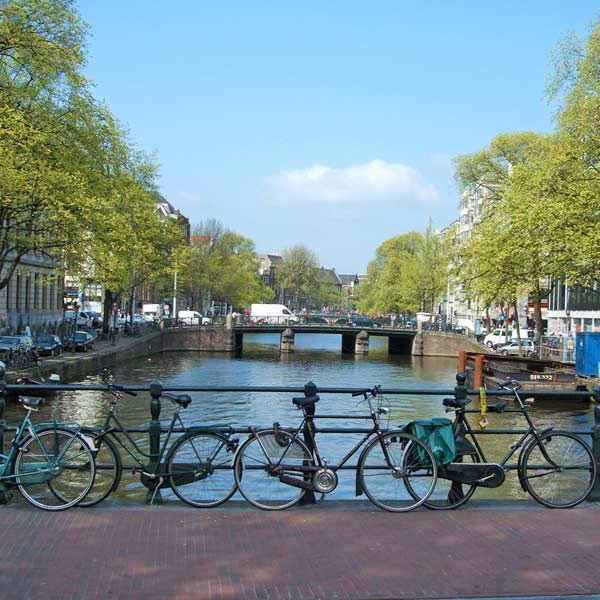
Amsterdam’s iconic canals, weaving through the city, create a picturesque and tranquil urban landscape
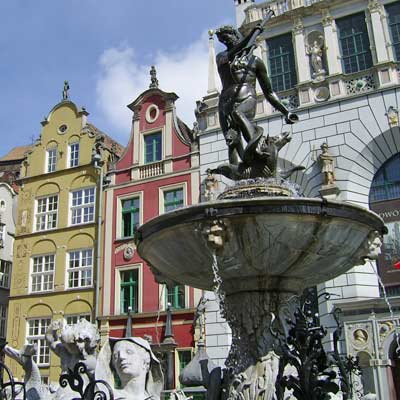
Neptune's Fountain in the historic centre of Gdansk
48hours in Gdansk
Gdansk has big-name sights like the iconic dockyards and its Old Town. But it also has secrets up its millennia-old sleeve. This 48-hour itinerary covers both, with a little bit of partying and beachside living thrown in for good measure…
The interactive map below shows a suggested route for the 48 hours in Gdansk, with day 1 highlighted in green and day two in yellow.
Day 1: Make for Cafe Libertas for breakfast. It's a popular spot with fruit bowls and artisan coffee that will fuel you up right in the heart of the Old Town. Stepping outside the door, you'll find quaint Chlebnicka street, which you can stroll between grand townhouses with Flemish-inspired façades.
At one end is Chlebnicka Gate, still flaunting its original medieval crest from 1450. Beyond is the riverside and the iconic Żuraw Crane. Now a branch of the National Maritime Museum, it's a great detour to make if you want to learn all about the history of shipbuilding in Gdansk.
Delve back into the maze of streets to the west and try to find the St. Mary's Church. It shouldn't be difficult – it's among the three largest brick-built churches on the planet! Past that is bustling Długa. The main drag of the city, it's awash with amber shops, bars, eateries and more.
Stop to sample some pierogi dumplings or grab a beer, and then move on to lovely Long Market square. That's where the famous statue of Neptune beckons, hemmed in by pastel-painted guilds. As evening arrives, return to Długa or Piwna street for basement bars that gush with vodka and cheap beer.
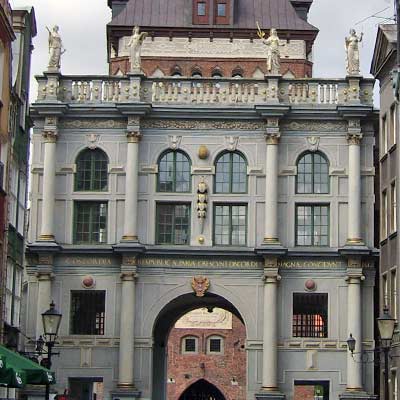
The Złota Brama (Golden Gate) is lined with figures depicting the qualities of the ideal citizen
Day 2: Morning of Day 2 takes you out to the legendary Gdansk Shipyards. If you haven't heard of these already, then buckle in for a history lesson in the fall of Communism. It was here, in 1980, that the powerful Solidarity movement first took route under the leadership of Lech Wałęsa. It would go on to fuel revolutions across the Eastern Bloc, which finished with the fall of the Berlin Wall and the end of Russian dominion in Europe.
There's nowhere better to uncover all that than at the European Solidarity Centre. A visit is likely to take a few hours, especially if you want to drop by the striking Monument to the Fallen Shipyard Workers of 1970 next door. For the afternoon, it's time to explore the Tri-City.
That means hopping on the SKM railway line from Gdańsk Główny. The ride to Sopot is only 15 minutes. It takes you to a lively resort area that's positively brimming with bars and eateries. It's also on the beach, so you might want to spend the evening here, moving between the music venues to famous Sopot Pier.

The European Solidarity Centre commemorates the Polish civil resistance and trade union which began in the Polish shipyards and ultimately led to the collapse of the communism in the USSR

Sopot has a beautiful beach and is an enjoyable destination during the summer season
48hours in Amsterdam
Day 1: Start in the Museum Quarter, home to some of Amsterdam’s world-class museums. Here, you'll find the Rijksmuseum, housing Rembrandt’s famous 'The Night Watch,' as well as the Van Gogh Museum and Stedelijk Museum, which boasts an extensive collection of works from artists such as Picasso and Warhol.
In the afternoon, explore the charming artisan neighborhood of Jordaan, known for its houseboats along the quays and crooked historical buildings. For nightlife, the lively areas of Leidseplein or Rembrandtplein are perfect destinations.

Spring at Dam Square with the Royal Palace in the background.
Day 2: Begin with a visit to Dam Square and the Royal Palace, then venture into the red-light district. A trip to the Anne Frank House offers a poignant experience; booking online ahead of time is highly recommended..
For a more relaxed evening, capture a beautiful photo from the Magere Brug. After dark, this bridge, adorned with over a thousand lights, provides a vantage point from which you can see 15 bridges simultaneously.
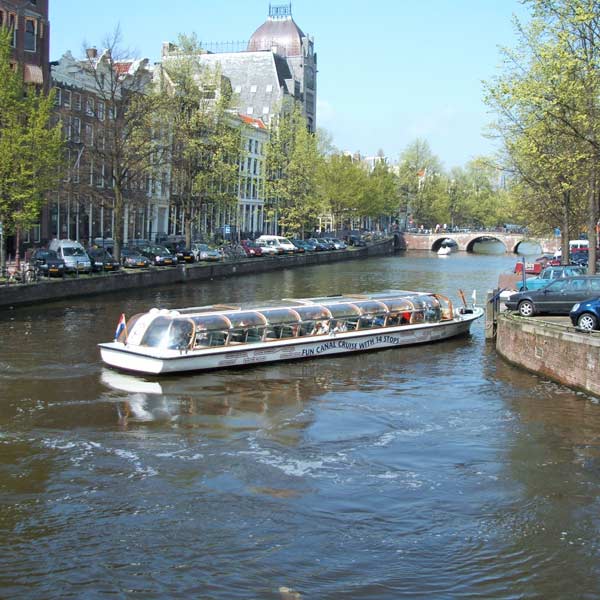
Boat cruise along a canal in Amsterdam
On arrival in Amsterdam Schiphol airport, the quickest way to get into town by public transport is the train which costs €5.40 and takes 20 minutes. The bus costs €5 and takes about 35 minutes.
Amsterdam is an expensive city. Walking and cycling are the best ways to get around. By boat you can see all the big sights too and there are many options for hop-on-hop-off. There is also an impressive public transport system of trams, buses, metros, trains and ferries to help you get around.

Rijksmuseum in Amsterdam
All cities have their perils but with regards to Amsterdam, probably the main ones to consider are bike safety and caution in the "coffee shops". As well as the usual bike safety rules you’d expect at home, keep an eye out for nippy scooters on the bike lanes and avoid rush hour if possible. In terms of the coffeeshop visits – don’t underestimate the effects of the products, as the varieties sold here are more potent than elsewhere.
Amsterdam is typically an extremely safe city for solo female travellers but it’s not advised to visit the Red Light District at night as the area does have a seedier vibe.
Getting to Gdansk by plane is easy because of the countless short-haul and low-cost carriers that now fly into the local Lech Wałęsa Airport. A mere nine miles outside of the centre, you can get to the terminals on the 210 bus from the main train station. There are often problems with scam taxi fares to and from the airport, so always agree a rough price beforehand (the normal rate is between 60-80 PLN).
Gdansk's Main City is a joy to walk. The streets of Długa and the quays are all connected by loads of hidden alleys and paths. It might pay to have a tourist map at hand because getting lost is almost inevitable if it's your first time in town.
To travel to the beaches, the shipyards, and Sopot, you'll need to make use of the trams and inter-city SKM trains. The former cost 3.2 PLN per ride. Tickets are available from vending machines at most stations. Be sure to validate as you board.
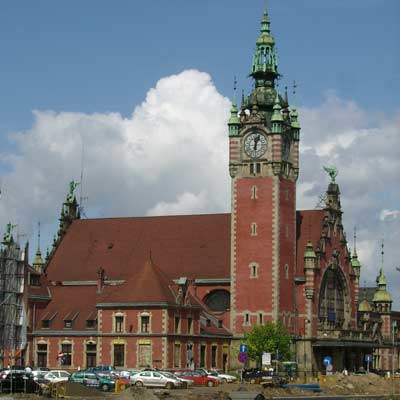
Gdansk Glowny - the main train station of Gdansk
The best location for a hotel in Gdansk is certainly in the Old Town area. There, you'll get boutique lodgings and stylish aparthotels set in centuries-old buildings. An alternative for those who favour beaches and nightlife would be to bed down in Sopot, where resort hotels with swimming pools and stylish restaurants are the norm.
Gdansk is among the most liberal and welcoming of Polish cities. It's got a vibrant LGBT scene and incidents of racism and crime are relatively rare. Still, there are still tensions in Poland and it's wise to be on your guard, especially if out at night in the bars of the Old Town.
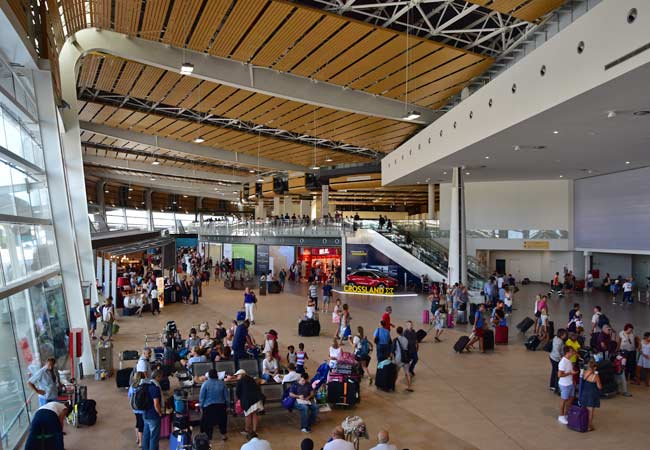
oh we were stuck in the airport!

Copenhagen was a bit expensive...

All we did was drink beer in Brussels...
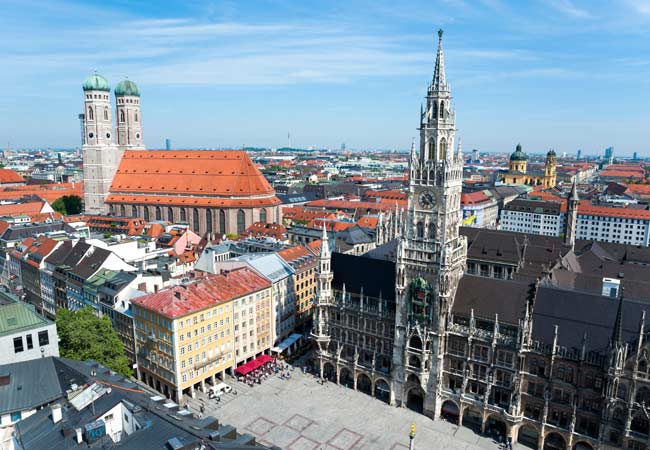
Muncih was crazy
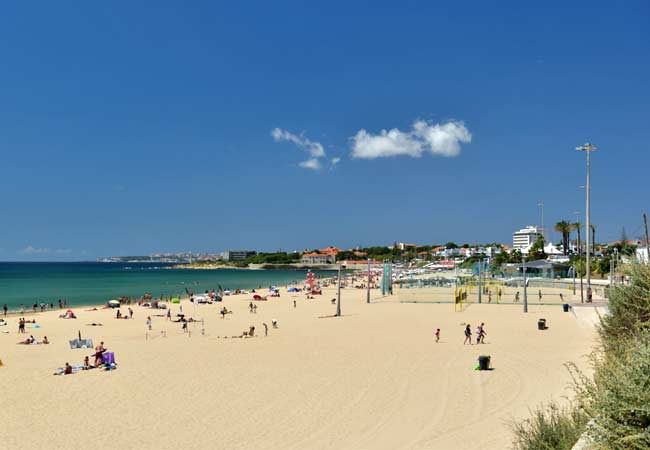
And we got so burnt!
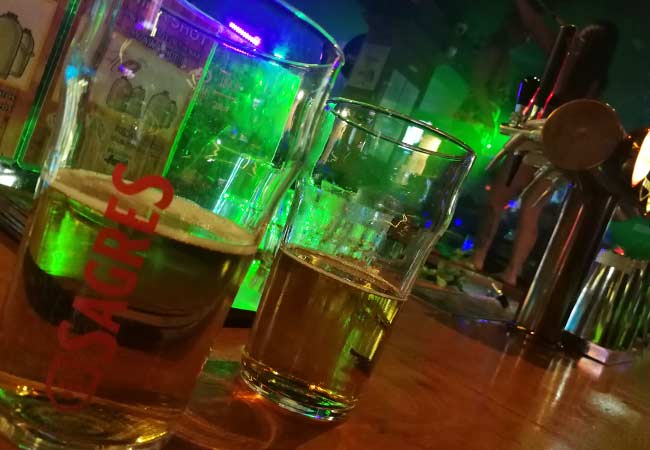
Remeber that night in Rome

oh we were stuck in the airport
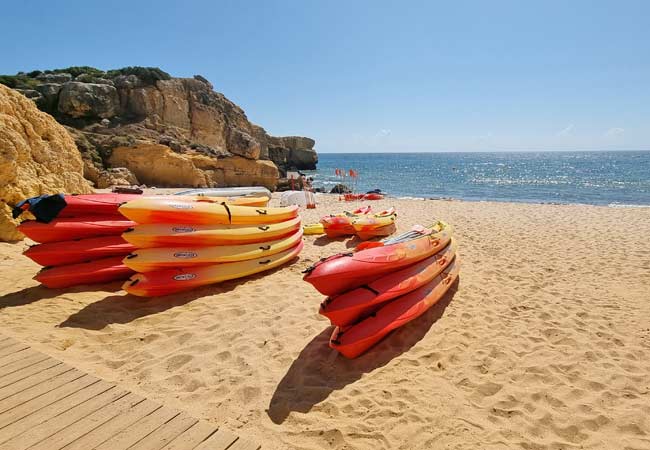
So much fun kayaking

Berlin and that group from Austria!

There was such a view from that church

And we got so burnt!

Munich was eventful, wasn't it!

Such a view from that cathedral in Florence
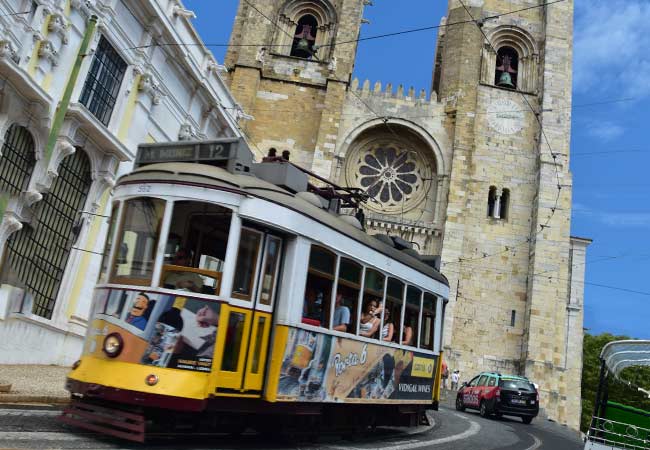
Lisbon was such so much fun

Last summer was so much fun .... x

Remeber that night in Rome

Lisbon was such so much fun

Such a view from that cathedral in Florence

Munich was eventful, wasn't it!

And we got so burnt!

Remeber that night in Rome

All we did was drink beer in Brussels...

Berlin and that group from Austria!

Can't wait to go back to Dubrovnik

Remember that boat ride in Prague

Copenhagen was a bit expensive...
